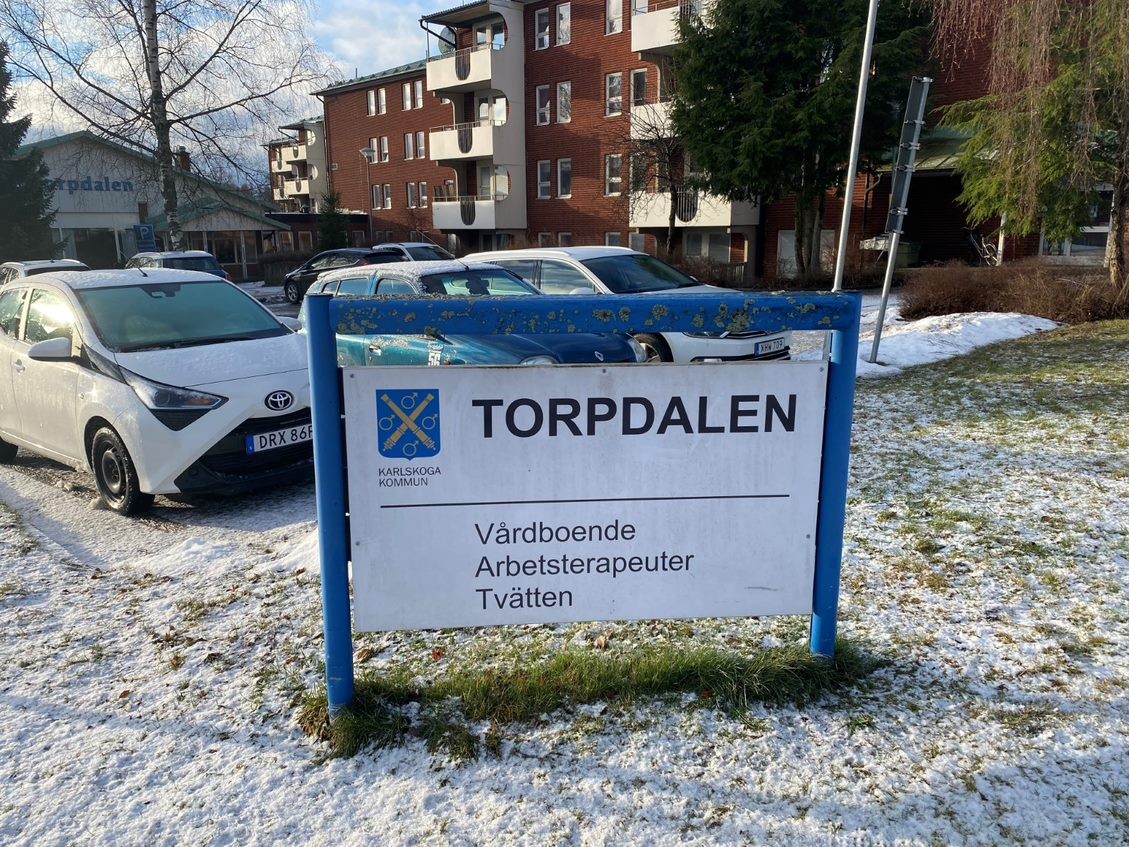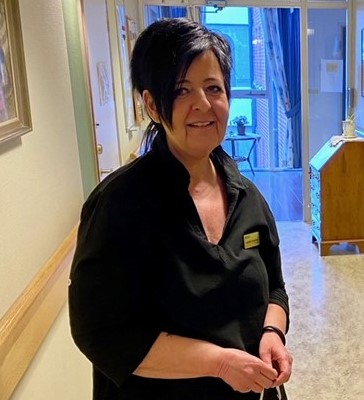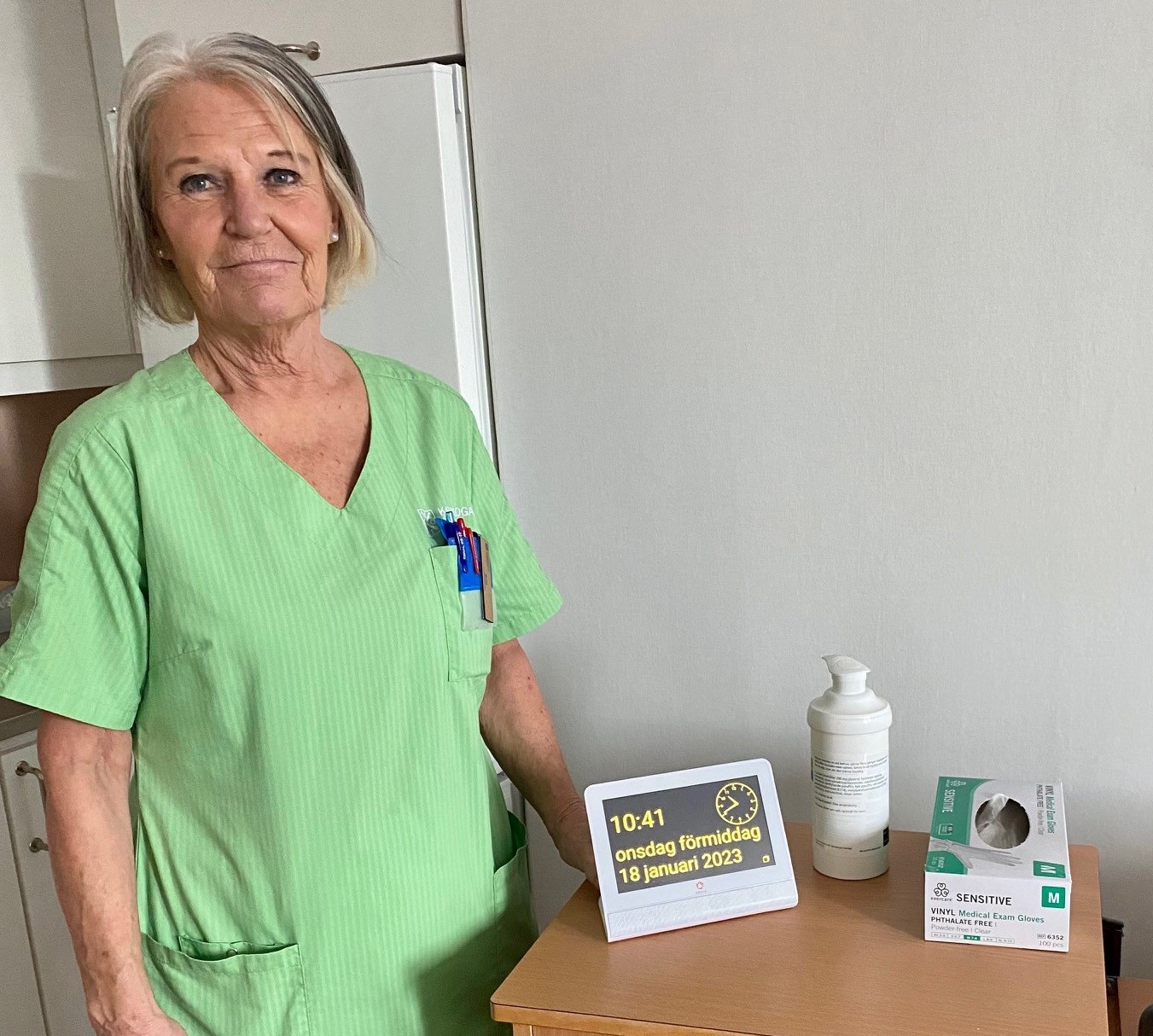
Torpdalen is a nursing home in the Karlskoga municipality in Sweden. It has 42 apartments divided in to seven departments for people with cognitive impairment. Approximately 50 people work throughout the departments to provide health and social care to the residents in the nursing home.
Camilla Lindquist is Unit Manager at Torpdalen. She is also responsible for new care and nursing homes that are under construction in the municipality. Villa Strå, is planned to be completed in 2025, will have 80 residents. Once completed, Torpdalen will close and activities will be transferred to Villa Strå.

Camilla’s leadership focuses on creating involvement, engagement, and a sense of community among the staff. When looking at the design of the new residential care and nursing home, Villa Strå, she asked staff for help. Staff were asked to read the report "Environmental adaptations that contribute to increased participation. Support to facilitate activity and participation for people with dementia ". It was developed by the Swedish Agency for Participation (MFD) as knowledge material about environmental adaptations for people with dementia.
Knowing whether it is day or night creates a sense of fundamental safety
MFD’s report contains suggestions for aids that meet different needs, such as support for time perception, memory, decision-making, and communication. For example, the report mentions that supporting time perception can create both a sense of fundamental security and contribute to a good daily rhythm.
Once the staff had read MFD’s report, they sat down and made a priority list of the environmental adaptations they wanted to see at the new home. These priorities were based on the report together with the needs they currently experience in Torpdalen’s operations.
One of the needs identified was to deal with anxiety and sleep problems at night among residents. A common concern night-time staff have witnessed is that residents ask what time it is. At present, the staff show their mobile phone which is often a nuisance as the screen lights up disturbing the resident more.
To meet the support needed for time perception, an evaluation of welfare technology was made. MEMOday from Abilia was chosen as the best aid to support people keeping track of the time of day.
MEMOday is a digital aid that shows easy-to-read information about the date and time, as well as whether it is morning, daytime, evening, or night. The information can also be read out loud. For people who struggle to keep track of the time of day, MEMOday provides an increased feeling of control, and thus a reduced sense of stress and anxiety.
A person with cognitive impairment spends a lot of energy every day making decisions, both big and small, and this makes the individual anxious. Therefore, staff at Torpdalen try to minimise the number of decisions a residents need to make, in order to make everyday life as smooth as possible. One element that can be removed is the question of which day it is, what time it is, and what time of day it is. An easy and clear way to get informed of day and time can instead provide a sense of security.
There is now a MEMOday in every apartment at Torpdalen. “Knowing what time it is adds a human value that cannot be measured, and it’s also a human right,” Camilla says.
Allow staff and residents to be their best selves
The decision to invest in the introduction of the digital aid MEMOday was made by the employees at the home. Camilla supported the decision, which was then approved by Social Manager Eva Persson and the management of the Social Services Department in Karlskoga Municipality, who had previously been in contact with Abilia.
Financing via the digitalisation grant made it possible to directly establish a broad implementation. Camilla’s confidence in the staff strongly contributed to the immediate purchase of all 42 MEMOday aids. If the digitalisation grant had not been available, Camilla would have made the purchases in stages.
Camilla believes that getting the staff acquainted with aids is very important. During a workplace meeting, the staff were permitted to feel and touch the time aid and, at the beginning of December 2022, the welfare technology was implemented in Torpdalen.
The introduction of the digital time aid has gone well. The staff already testify that the support works very well and meets the residents’ need to orientate themselves in time. When the staff encounters a person with cognitive impairment, they will ask one question at a time and wait for the answer. If a lot of questions are asked at the same time, it becomes difficult for the individual, who may then be unable to answer any of the questions. There are fewer questions about day and time with MEMOday resulting in less anxiety among the residents. The effect is that there is more quality when meeting with residents, and it is easier for both the residents and the staff to communicate.
The big difference is at night, as residents can easily get a perception of time and return to their much needed sleep. This is also confirmed by a family member, who reports that they no longer receive calls in the middle of the night by their relative in Torpdalen.
Once again, Camilla describes the importance of the fundamental need to know what day and time it is, and that it contributes to an individual's sense of control. This is confirmed by one of the residents, who says that she has experienced great benefit and joy in knowing what day of the week it is, and what time it is. She likes the feature where a voice reads out the information that is shown on the screen, so it becomes even clearer what day and time it is. She likes to press the button on her MEMOday to have it read out loud.

Camilla has full trust in the staff, and she knows how important it is for employees to be involved in successfully implementing digital technology in the business.
"Why do I go to work every day? Well, I want satisfied tenants and employees who are involved – and I want to support people to be their best self," Camilla concludes.
Here you can read more about how Abilia’s welfare technology supports individuals, staff, and operations within elderly care.
----------------------------------------------------------------------------------------------------------------------------------------------------
Environmental adaptations that contribute to increased participation - a report from the Swedish Agency for Participation
The Swedish Agency for Participation has, on behalf of the Swedish government, produced material on how environmental adaptations for people with impaired decision-making capacity can minimise restrictive and forced measures, such as locked doors. The target group is family members of people with dementia, as well as staff in care homes.
An increased proportion of international studies emphasises the connection between quality of life and well-thought-out design for the elderly. It has been shown that using mental ability, performing daily activities, engaging in meaningful activities, and socialising with other people are just as important to both those affected by dementia and those who are not.


